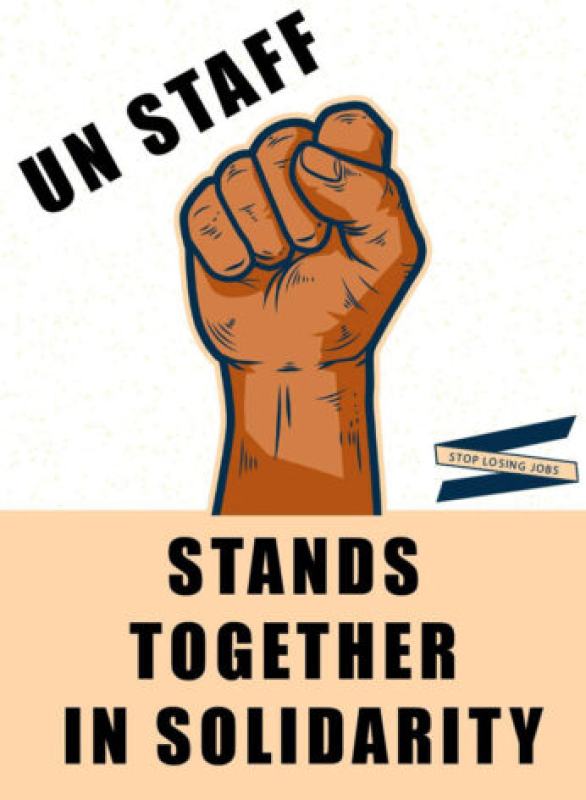- Israel Strikes Tehran with US Support Amid Nuclear Tensions |
- India Sees 9% Drop in Foreign Tourists as Bangladesh Visits Plunge |
- Dhaka Urges Restraint in Pakistan-Afghan War |
- Guterres Urges Action on Safe Migration Pact |
- OpenAI Raises $110B in Amazon-Led Funding |
UN Staff Survey Reveals Deep Concerns Over Reform Plan

UN staff in solidarity
The Coordinating Committee for International Staff Unions and Associations of the United Nations System (CCISUA) staff federation recently conducted a quick survey among staff in its member unions to gather their views on the UN80 initiative. The respondents expressed a clear lack of confidence in the way UN80 is being led and implemented. Many were disappointed by the absence of proper consultation and voiced serious concerns about the potential negative impact on the organization’s mandate and staff.
A significant majority, 72 percent, felt that the proposed cuts to posts and relocations were not based on sound rationale, while 62 percent doubted that the reforms would improve the UN’s effectiveness and relevance. About 73 percent disagreed with the decision not to reduce the number of Under-Secretary-General (USG) posts, and 60 percent believed the reforms would not make the UN more relevant to the needs of its beneficiaries. Confidence in leadership was notably low: 51 percent lacked trust in Guy Ryder’s leadership of UN80, only 18 percent expressed confidence in Secretary-General Antonio Guterres, while 48 percent did not. More than half of the respondents, 55 percent, showed willingness to support collective staff actions.
Further findings revealed that 78 percent of staff felt excluded from consultations about UN80, and 59 percent did not expect the overall impact to be positive. Sixty percent believed senior management did not understand staff concerns, and 57 percent doubted that senior management were the right people to lead the reforms. Moreover, 63 percent did not believe the reforms would restore faith in the multilateral system, and 65 percent felt management had failed to communicate clearly about UN80. Confidence in the leadership of individual entities was also low, with 56 percent expressing distrust.
Among those supporting collective staff actions, at least 40 percent were in favour of measures such as petitions, symbolic workplace actions, peaceful protests, staff assemblies, or work stoppages. The comments collected during the survey reflected deep dissatisfaction with the process, perceived unfairness, and distrust of leadership. Staff called for genuine, inclusive reforms that address inefficiencies without damaging morale or the UN’s credibility.
Many respondents criticized the lack of transparency and communication, feeling the reforms were poorly explained, with major decisions made without meaningful consultation. There was widespread frustration over the disproportionate impact on lower-level staff, as cuts appeared to target General Service (GS) and junior Professional-level posts, while senior management positions remained untouched, leading to perceptions of a top-heavy structure. Confidence in senior leadership was low, with many feeling that those in charge were disconnected from realities on the ground. Staff morale was described as very low, with anxiety over forced relocations, arbitrary cuts, and potential retaliation for speaking out.
Several comments alleged political motives and favoritism in the reform process, suggesting that cuts were driven by convenience rather than organizational need. Despite these concerns, many staff agreed that reform is necessary but criticized the rushed, top-heavy approach that lacked strategic vision. There were broader worries that the UN’s credibility could suffer, as some feared the reforms would make the organization less effective and less relevant to member states and beneficiaries.
The survey was conducted between 21 and 27 July 2025 and included 3,850 staff members. The results are statistically significant and representative of staff views within the UN Secretariat, who are directly affected by UN80. Responses from other UN entities will be shared with their governance bodies. The CCISUA is an international federation comprising UN common system staff unions and associations dedicated to promoting constructive cooperation and equitable staff representation. Nathalie Meynet currently serves as President of CCISUA.

